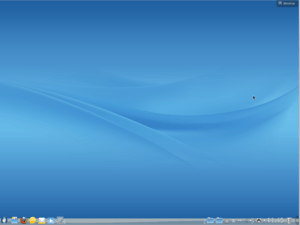ROSA Linux
 | |
|
Rosa Marathon 2012 LTS | |
| OS family | Unix-like |
|---|---|
| Working state | Current |
| Source model | Open source |
| Initial release | 1 December 2010 |
| Latest release | Desktop Fresh R8 / 3 August 2016[1] |
| Available in | Multilingual |
| Package manager | RPM |
| Platforms | x86, x86-64 |
| Kernel type | Monolithic (Linux) |
| Userland | GNU |
| Default user interface | KDE4, KDE Plasma 5, MATE and GNOME |
| License | Mainly GPL and other free software licenses, minor additions of proprietary |
| Official website |
rosalinux |
ROSA Linux is a Linux operating system and distribution, developed by Russian company LLC NTC IT ROSA. It is available in three different editions: ROSA Desktop Fresh, ROSA Enterprise Desktop and ROSA Enterprise Linux Server, with the latter two aiming at commercial users. Its desktop editions come bundled with closed-source software such as Adobe Flash Player, multimedia codecs and Steam.
ROSA Desktop Fresh R8, the newest desktop release, is available with four different desktop environments: KDE4, KDE Plasma 5, MATE and GNOME.[2][3] It also contains open source software developed in-house by ROSA, such as ROSA Image Writer or ROSA Media Player.[4] ROSA Linux has been certied by the Russian Ministry of Defence.
ROSA originated as a fork of now defunct French Linux distribution Mandriva and has since then been developed independently. The ROSA company was founded in early 2010 and released the first version of its operating system in December 2010. It initially only targeted enterprise users, but in late 2012, ROSA started its end-user oriented distribution, Desktop Fresh. Several distributions aimed at former Mandriva users, such as OpenMandriva Lx or MagOS Linux, are now themselves based on ROSA. Before its bankruptcy, Mandriva developed its last releases jointly with ROSA.[5] Mandriva 2011 was also based on ROSA. ROSA Enterprise Linux Server is based on Red Hat Enterprise Linux.
Although its main popularity is in the Russian-speaking market, ROSA Desktop also received favorable reviews by several non-Russian online publications. German technology website Golem.de praised ROSA for its stability and hardware support,[6] while LinuxInsider.com called ROSA "a real Powerhouse".[7]
References
- ↑ "ROSA Fresh R8 is out!". 3 August 2016.
- ↑ "Downloads". 18 February 2016.
- ↑ DistroWatch. "Distribution Release: ROSA R8 (DistroWatch.com News)".
- ↑ "Our products". 19 February 2016.
- ↑ open, heise. "OpenMDV: Das Community-Mandriva nimmt Gestalt an".
- ↑ "Linux-Distributionen im Test: Rosa Desktop Fresh kooperiert mit aktueller Hardware - Golem.de".
- ↑ "Rosa Is a Real Powerhouse - Reviews - LinuxInsider".
